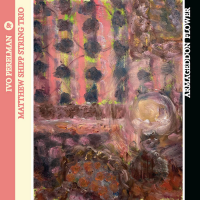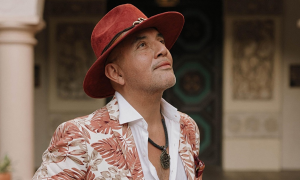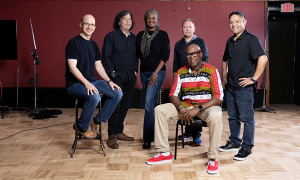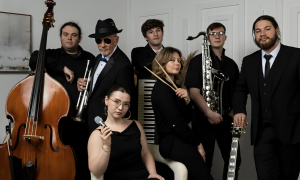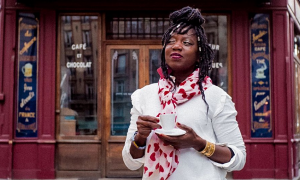Home » Jazz Articles » Take Five With... » Take Five with Alex Lefaivre
Take Five with Alex Lefaivre
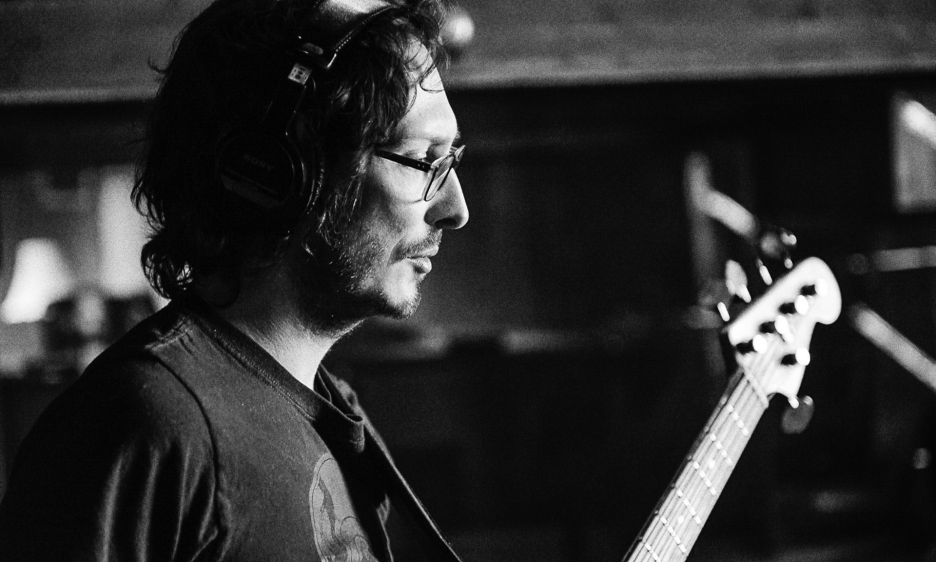
Born and raised in Montreal, Canada, Alex Lefaivre is a bassist known for his unique artistic voice, virtuosic skill, passionate work ethic and easy going personality. Equally proficient on both the upright and electric bass, he enjoys a busy schedule as a freelancer in a wide variety of musical styles. Alex is also composes to picture, having recently contributed to the score of Tony Speed, a French-Canadian comedy premiering in select theatres and festivals in Quebec this summer. He is mostly know for his work in
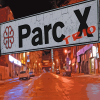
Parc X Trio
band / ensemble / orchestrab.2007
Your sound and approach to music.
As a bassist, I love a deep, fat sound that also has a lot of clarity and punch.
As an improvisor, I really try to pay attention to what's going on around me, and hopefully I'll react in an organic way that makes everything else sound good. I'm quite lucky that very early on, I connected with some friends where the quality of listening was very high, and it's marked me ever since. It's very similar to when I have a conversation; I'm not really thinking so much about what I'm going to say, I just pay attention to what the other person is talking about and I respond accordingly, in that moment. Also, I want every single note that I play to have a deep emotional connection to my soul, I don't want to just wiggle my fingers around. I try to be as present as possible in the music and give it everything I can. It's almost a holistic experience for me. I feel like it's a privilege every time I get to play.
Compositionally, for my latest record, I wanted to explore something different than my previous work. Over the last decade with Parc X Trio, the material became more progressive and complex, with long, multi-sectional forms and a lot of through-composed arrangements. For YUL, I wanted something looser and also closer to the jazz tradition. I wanted it to be based on leadsheets without set arrangements, that gave the musicians a lot of room to improvise, even while playing the head. I wanted the melodies to be memorable and strong while also presenting a form and chord sequence that would be fun and interesting to blow on as well, in the vain of

John Coltrane
saxophone1926 - 1967

Herbie Hancock
pianob.1940

Thelonious Monk
piano1917 - 1982

Wayne Shorter
saxophone1933 - 2023

Pat Metheny
guitarb.1954
Teachers and/or influences?
A lot! I definitely took the scenic route when it came to studying music. My first real bass teacher was Laureat Cormier, a super heavy fusion cat with a twin brother who played the drums. He also performed on a lot of local TV gigs in Montreal at the time. He was the first guy to teach me all of the basics; the notes on the bass, scales, chords, reading and jazz. A lot of it was way above my head at the time, but he really opened up the flood gates. He had to stop teaching due to health problems, so I decided to switch to upright bass. I tried one year at the Conservatory here in Montreal, studying classical music. It was great as a foundation for technique, and it also put the bar very high, but ultimately I didn't want to commit to being an orchestral musician, I loved jazz. I did my undergraduate degree at the University of Montreal with

Michel Donato
bass, acousticb.1942

Miles Davis
trumpet1926 - 1991

Bill Evans
piano1929 - 1980
I just recently completed my Master's degree in Jazz Performance and Composition at the University of Montreal, ten years after my Bachelor's degree. I got to study quite a bit with

John Roney
piano
George Shearing
piano1919 - 2011

Christine Jensen
saxophoneI've also had the privilege a taking private lessons with a few other great musicians. A few years ago, I took one lesson from electric bassist Rich Brown in Toronto. He really got me thinking about exploring different colours on chords and really hearing them in my mind's ear. For example, being able to target the 9th and 13th of a minor chord. As a bassist, it can be quite challenging to stray away from the root or the triad, so this was kind of a game changer. He was also the first guy to get me into transcribing, or basically just learning stuff by ear. While doing my Master's degree, I also took a few lesson with

Remi Bolduc
saxophone, alto
Jean-Michel Pilc
pianob.1960
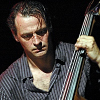
Francois Moutin
bass
Ari Hoenig
drumsb.1973
How would you describe the state of jazz today?
I think jazz is alive and well, probably the best shape it's ever been in. There are more and more musicians, and they are getting better and better. I find that there are so many talented composers and improvisors that have unique identities and mind-blowing musicianship, it's insane! We're also finding buried treasures like Coltrane's Both Directions at Once. And with streaming, you can listen to anything you can think of, you're no longer limited to your local record store. Also, with the internet, there's a whole indie culture that bypasses the traditional system of labels. You can discover people from all over the world, that you certainly never would have heard of before. I'm very inspired by the music that I hear all around me.
What are your favorite jazz albums?
Here's my top 10. Generally, I listen to a lot of new music. I try to keep an ear to the ground and stay current, while also digging deeper into the past. These are the jazz albums that I seem to always go back too, especially if I want to get into a "comfort zone" kind of mindset and am looking for something familiar. I still discover new things every time I listen to these recordings.
- Thelonious Monk, Plays Duke Ellington
 " data-original-title="" title="">Hank Mobley, Soul Station
" data-original-title="" title="">Hank Mobley, Soul StationHank Mobley
saxophone, tenor
1930 - 1986- Miles Davis, Kind of Blue
- Bill Evans Trio, Live At The Village Vanguard
- Pat Metheny, Bright Size Life
- Jean-Michel Pilc, Live At Sweet Basil
 " data-original-title="" title="">Kurt Rosenwinkel, East-Coast Love Affair
" data-original-title="" title="">Kurt Rosenwinkel, East-Coast Love AffairKurt Rosenwinkel
guitar
b.1970- Wayne Shorter, Footprints Live
 " data-original-title="" title="">Aaron Parks, Invisible Cinema
" data-original-title="" title="">Aaron Parks, Invisible CinemaAaron Parks
drums
b.1983 " data-original-title="" title="">Gilad Hekselman, Split Life
" data-original-title="" title="">Gilad Hekselman, Split LifeGilad Hekselman
guitar
b.1983
I'm releasing my new album, YUL, in a couple of weeks, so that's pretty exciting. I have a few gigs in Montreal to celebrate and promote the record. There will be other Canadian concert dates in the fall as well. I plan on bringing the band to the USA and Europe in 2019. I'd also love to record an album of acoustic standards with the same band within the next year. I
With Parc X Trio, we have been doing a monthly series at Upstairs Jazz Bar and Grill back home in Montreal, where we pay tribute to different jazz composers. We've covered Jobim, Monk, Pat Metheny, Wayne Shorter, Hank Mobley and a bunch of other stuff. Frankly, it's just always been on my bucket list to learn a bunch of these songs and it's wonderful to have such a great venue support us in this project. It's been a great learning experience, and it took us back to our acoustic roots. It's also a lot of fun to focus on different material after mainly performing your own compositions for over a decade. We are setting time aside this winter to bunker down, write and rehearse new material. We also have a suite called "Orbit" that we performed a few times in 2012 that we never recorded, so we might do that in the fall so we can close that chapter.
My label, Multiple Chord Music, will release an album by Montreal-based alto saxophonist

Benjamin Deschamps
saxophone, altob.1988

Steve Grossman
saxophone1951 - 2020

Jimmy Heath
saxophone, tenor1926 - 2020

Archie Shepp
saxophone, tenorb.1937

Barry Harris
piano1929 - 2021
Tags
Take Five With...
Alex Lefaivre
Michael Ricci
Challenge Records
John Coltrane
Herbie Hancock
Thelonious Monk
Wayne Shorter
pat metheny
Benjamin Deschamps
Steve Grossman
Jimmy Heath
archie shepp
Barry Harris
Comments
PREVIOUS / NEXT
Support All About Jazz
 All About Jazz has been a pillar of jazz since 1995, championing it as an art form and, more importantly, supporting the musicians who make it. Our enduring commitment has made "AAJ" one of the most culturally important websites of its kind, read by hundreds of thousands of fans, musicians and industry figures every month.
All About Jazz has been a pillar of jazz since 1995, championing it as an art form and, more importantly, supporting the musicians who make it. Our enduring commitment has made "AAJ" one of the most culturally important websites of its kind, read by hundreds of thousands of fans, musicians and industry figures every month.
Go Ad Free!
To maintain our platform while developing new means to foster jazz discovery and connectivity, we need your help. You can become a sustaining member for as little as $20 and in return, we'll immediately hide those pesky ads plus provide access to future articles for a full year. This winning combination vastly improves your AAJ experience and allow us to vigorously build on the pioneering work we first started in 1995. So enjoy an ad-free AAJ experience and help us remain a positive beacon for jazz by making a donation today.

Montreal
Concert Guide | Venue Guide | Local Businesses
| More...









 Buy Now
Buy Now


